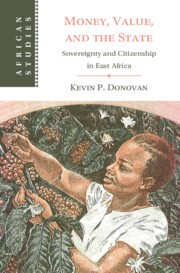
- Publisher:
- Cambridge University Press
- Online publication date:
- December 2024
- Print publication year:
- 2024
- Online ISBN:
- 9781009501385
- Subjects:
- Area Studies, African Studies, History, African History, Economic History
- Series:
- African Studies (169)

Decolonization in East Africa was more than a political event: it was a step towards economic self-determination. In this innovative book, historian and anthropologist Kevin Donovan analyses the contradictions of economic sovereignty and citizenship in Tanzania, Kenya and Uganda, placing money, credit, and smuggling at the center of the region's shifting fortunes. Using detailed archival and ethnographic research undertaken across the region, Donovan reframes twentieth century statecraft and argues that self-determination was, at most, partially fulfilled, with state monetary infrastructures doing as much to produce divisions and inequality as they did to produce nations. A range of dissident practices, including smuggling and counterfeiting, arose as people produced value on their own terms. Weaving together discussions of currency controls, bank nationalizations and coffee smuggling with wider conceptual interventions, Money, Value and the State traces the struggles between bankers, bureaucrats, farmers and smugglers that shaped East Africa's postcolonial political economy.
‘Written with great verve and clarity, and offering valuable insights into any number of questions, Money, Value, and The State is a welcome addition to the literature on the potency of currency as a social, ethical, and political form. The methodological innovation of the work is especially important. Drawing on both ethnographic encounters and historical archives, and offering a powerful comparative example that covers East Africa as a complex region, Money, Value, and The State should find a wide readership.'
Brad Weiss - Professor of Anthropology, College of William & Mary
‘Kevin P. Donovan offers a compelling new way to think about statecraft in East Africa after independence: as an attempt to monopolize value. This novel analysis places money and financial institutions at the heart of policies aimed to change the behaviour of citizens of new states. Donovan's book shows how the control of money became a field for contested ideas of personal and national sovereignty - a site for attempts by both people and government to imagine the future.'
Justin Willis - Professor of History, Durham University
Usage data cannot currently be displayed.